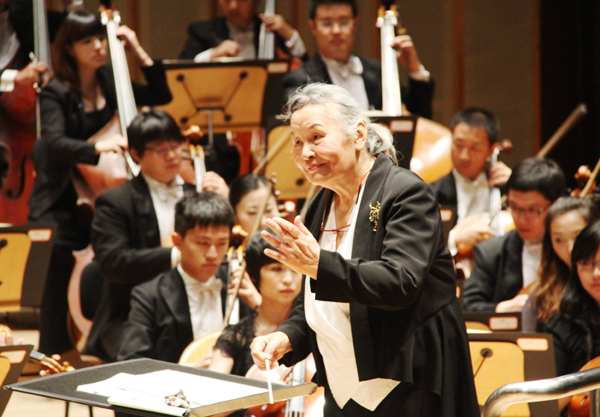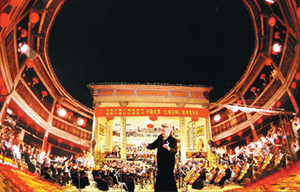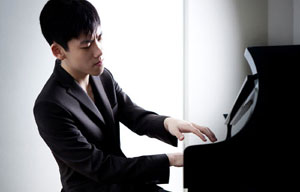Classical music's great champion
Updated: 2013-04-23 09:19
By Raymond Zhou (China Daily)
|
||||||||
 |
|
Zheng Xiaoying, 84, conducts the Xiamen Philharmonic Orchestra at a performance in Singapore on April 12. Hu Junxin / Xinhua |
Symphonic music is more revered than loved in most Chinese cities. But one musician is bent on changing that. With guileless sincerity and boundless energy, she has won over skeptics and added luster to a city whose music tradition was for a while disrupted, writes Raymond Zhou.
Zheng Xiaoying is 84 years young. Yes, young. When she talks about her orchestra, you would never guess she is way past retirement age and this is her second or third career. A lesser mortal would probably have been struck down, both physically and mentally, by a fraction of the difficulties she has encountered.
One of those difficulties is the constant battle to get funded.
"To obtain financial support, you have to show your value to a city and its residents," says Zheng, founder and resident conductor of the Xiamen Philharmonic Orchestra in Fujian province.
Fifteen years ago, she departed from her position as principal conductor for the Central Opera Company in Beijing and founded the Xiamen Philharmonic. At first, city administrators did not understand why an orchestra had to spend so much on labor and instruments and play music few in the city could understand.
Zheng, the first female conductor in New China, started in an environment where classical music was more a puzzle than an asset. The Asian financial crisis hit right before its premiere in 1998 and the sponsor who had pledged to pay for the first concert fled with the pledged money. She recalls an incident when a municipal official earmarked a sum for the orchestra, adding it was for her sake. "I would have gotten up and left if not for the survival of the orchestra. That person did not know how important an orchestra would be to the city. He was doing me a personal favor."
After 1,200 concerts, the Xiamen Philharmonic is now a fixture on the city's cultural landscape and Zheng a local heroine. Unlike most orchestras in China, hers is not affiliated with the local government and gets only 35 percent of funding from it, with an additional 45 percent from corporate donors and 20 percent from the box office. This has turned out a much healthier mix of funding than most orchestras in the country, but as such, she has also endured more upheavals.
Her orchestra plays 45 percent of concerts for its music season, 27 percent for public service and the remainder for pure commercial engagements.
Yet, she does not wax nostalgic for the "good old days" of full State subsidy. When she was conducting for the Beijing-based opera house in the 1990s, there were only five or six performances a year, for a company of 300-plus staff. "People simply did not show up for work," says the Fujian native, who had been director of the department of conducting with the Central Music Conservatory prior to that. "They were paid a meager base salary, and they were more interested in moonlighting. But a professional orchestra has to practice every day to maintain its quality."
|
|
|

 'Taken 2' grabs movie box office crown
'Taken 2' grabs movie box office crown
 Rihanna's 'Diamonds' tops UK pop chart
Rihanna's 'Diamonds' tops UK pop chart
 Fans get look at vintage Rolling Stones
Fans get look at vintage Rolling Stones
 Celebrities attend Power of Women event
Celebrities attend Power of Women event
 Ang Lee breaks 'every rule' to make unlikely new Life of Pi film
Ang Lee breaks 'every rule' to make unlikely new Life of Pi film
 Rihanna almost thrown out of nightclub
Rihanna almost thrown out of nightclub
 'Dark Knight' wins weekend box office
'Dark Knight' wins weekend box office
 'Total Recall' stars gather in Beverly Hills
'Total Recall' stars gather in Beverly Hills
Most Viewed
Editor's Picks

|

|

|

|

|

|
Today's Top News
Russia criticizes US reports on human rights
China 'aims to share its dream with world'
Chinese president appoints 5 new ambassadors
Nation's IPR suits see spike in 2012
H7N9 not spread between humans: WHO
Health new priority for quake zone
Sino-US shared interests emphasized
China, ROK criticize visits to shrine
US Weekly

|

|








